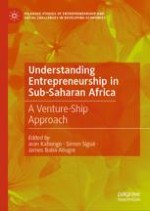2024 | OriginalPaper | Buchkapitel
8. Challenging Established Structures: Gender and Rural Entrepreneurship in Sub-Saharan Africa
verfasst von : Merezia Wilson Bambaganya, Johan Gaddefors
Erschienen in: Understanding Entrepreneurship in Sub-Saharan Africa
Verlag: Springer Nature Switzerland
Aktivieren Sie unsere intelligente Suche, um passende Fachinhalte oder Patente zu finden.
Wählen Sie Textabschnitte aus um mit Künstlicher Intelligenz passenden Patente zu finden. powered by
Markieren Sie Textabschnitte, um KI-gestützt weitere passende Inhalte zu finden. powered by
